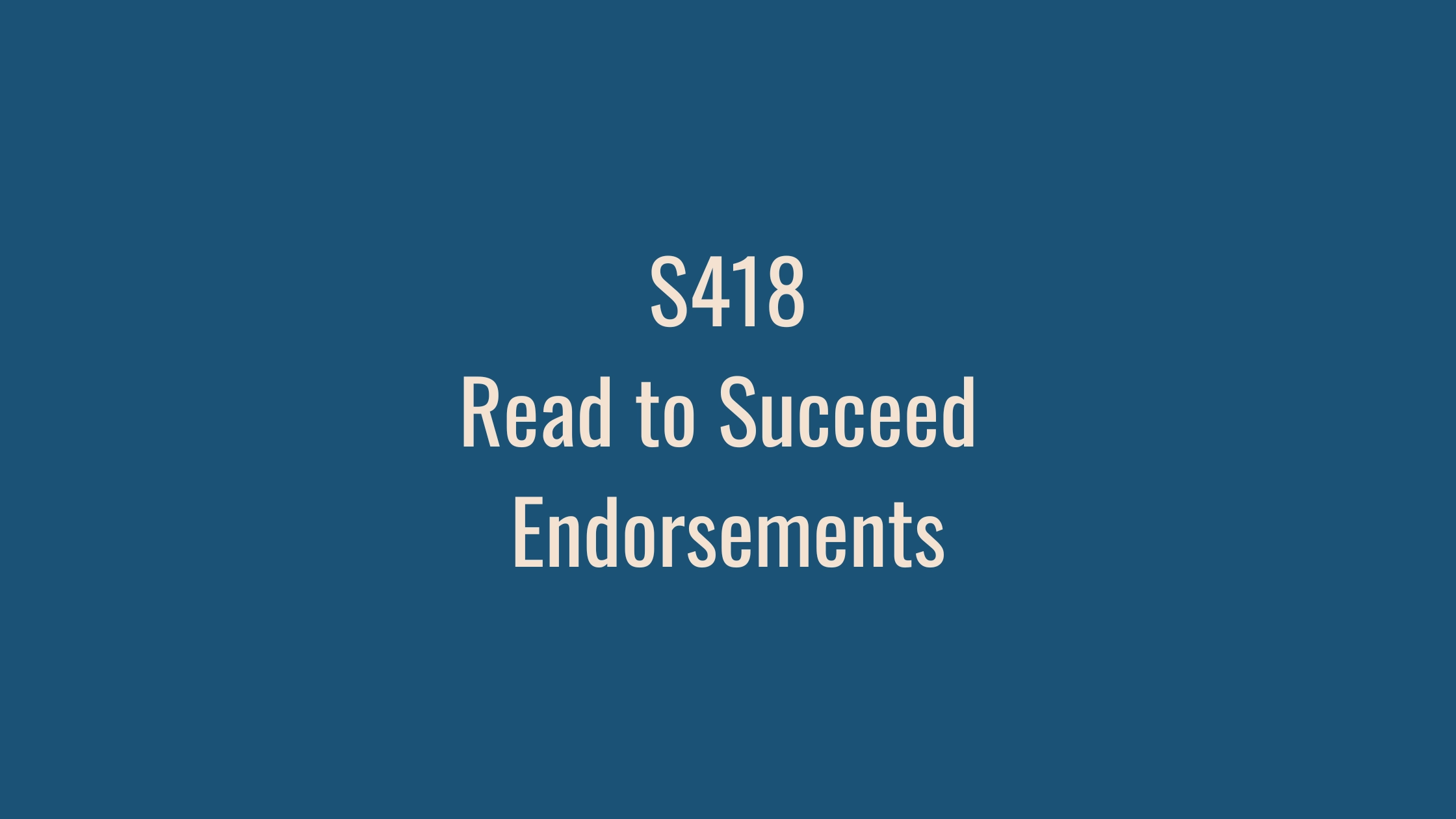Did you know the General Assembly actually passed a bill mirroring the mess we noted in S905: Read to Succeed? It’s brand spanking new law!
Why is this bill problematic too?
Let’s quickly point out the big issue within S418 in SECTION 2. Section 59-155-120 (10) states:
"Science of reading" means the comprehensive body of scientific research on how proficient reading develops, why some students have difficulty learning to read, and the scientifically based approaches to effectively, explicitly, and systematically teach students to read, including foundational literacy skills. The science of reading also addresses the developmental stages of reading, effective instructional strategies, the identification and support of diverse learners, including those with reading difficulties such as dyslexia, and the application of these research findings in an educational setting to ensure effective reading instruction and literacy development for all students."
PAUSE: Is this equitable? Yes, indeed! The science of reading is about equity in education. It emphasizes early identification of reading difficulties, tailored instruction for diverse learners, and data-driven decisions, aiming to provide every child, regardless of background or challenges, with equal opportunities. This approach is 100% about leveling the playing field. THAT, MY FRIENDS, IS EQUITY.
Now, let's dive straight into the heart of the matter with S418. Both this bill and S905 share similar goals: to attempt to enhance reading skills and literacy among children in South Carolina. The importance of ensuring our children can read effectively is undisputed. However, when we examine S418 more closely, it raises some conservative concerns.
First, S418 overhauls the Read to Succeed Office, effectively saying, "Thanks, but we'll take it from here," and transfers control to the State Department of Education (SCDE). South Carolina's Read to Succeed initiative was established by the South Carolina Read to Succeed Act passed in 2014. S418 introduces significant changes to this initiative, primarily by shifting administrative responsibilities directly to the SCDE. It requires detailed data reporting from districts on the success of summer reading camps and student assessments, underpinning accountability and funding implications. The bill also mandates the development of a state reading proficiency plan, aligned with the science of reading and structured literacy, to be approved annually. Furthermore, it standardizes the use of universal screeners for early identification of reading deficiencies and modifies the criteria for mandatory retention of third graders, ensuring targeted support and interventions. It requires SCDE-delivered professional development in foundational literacy skills for K-3 teachers and administrators.
At first glance, this might seem like streamlining—cutting through bureaucratic red tape, right? However, it centralizes power, concentrating authority in the lap of the SCDE.
PAUSE: Why is our Republican-majority General Assembly pushing for laws that hoard more power at the center?
This matters because local districts lose their ability to tailor reading programs to their unique communities. What works in one district might not work in another, but this bill overlooks such nuances in favor of a one-size-fits-all approach. And let's be blunt—when has "one-size-fits-all" ever really fit everyone?
Then there's the issue of universal reading screeners. The bill mandates their use and sets strict guidelines for their administration. It adds more red tape, with the SCDE dictating what tools to use and how to use them.
And let's take a look at section SECTION 7, Section 59-155-160: Mandatory Retention. They're essentially flunking third graders who aren't up to par, unless they fit into a few narrow escape hatches. It's brutal—kids aren't cookie-cutter replicas; they learn to read in their own time and way. Now, as for these exemptions, they're a bit of a head-scratcher once you dive in.
The exemptions to mandatory retention include:
Students with Limited English Proficiency
Participants in Summer Reading Camps
Students Demonstrating Proficiency through Alternative Assessments
Students Who Have Received Two Years of Reading Intervention and Were Previously Retained
What is the point of all these exemptions? To ensure EQUITABLE outcomes.
So, what are the conservative concerns here? Overcentralization: this law further consolidates power and decision-making authority away from local entities and into the state's hands. The closer decision-making is to those it affects, the better the outcomes tend to be. That's a principle worth defending.
Next problem, this is yet another law codifying equity approaches into the education system.
Oh and yikes, brace yourselves for a possible tax hike to cover the whopping $50 million yearly bill for teacher training and summer reading camps. If the state isn't planning to shuffle existing funds around, guess where they're looking next? Your wallet. Whether taxes go up depends on what the legislative bigwigs decide, but don't just sit there—hit up your Senator or Representative who voted yes to this law and ask them about the cost.
You can find who voted for this bill HERE.
In summary, as stated within our article in S905:
“Legislation like this will NOT solve the real problems. If we cannot control the garbage to which children are exposed and with which they are being indoctrinated, it makes absolutely no difference how we try to teach them to decode words. Teaching methods can have their own purposes, and the Left has used bad teaching methods to effectively cause a multitude of problems. These problems are where the defense must be raised, not by this terrible bill. Reading is being used to culturally, intellectually, psychologically, emotionally, historically, and in every way you can imagine, instill the Marxist, anti-American, DEI, sexual and other transformations into our society and destroy our great nation.”

Subscribe to ConservaTruth's Email Newsletter for curated insights on South Carolina's legislative activities and conservative viewpoints, delivered straight to your inbox! With vetted and easy-to-understand information, our newsletter empowers you to become an informed and engaged citizen, actively participating in safeguarding our cherished Constitutional values. Don’t miss out on crucial updates—join our community of informed conservatives today!





Comments